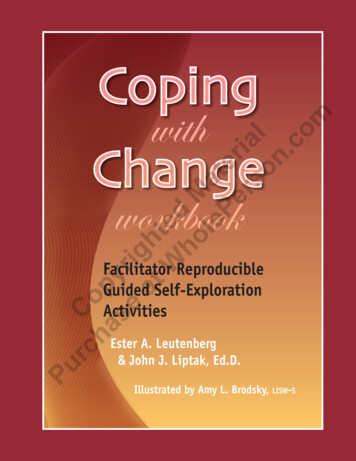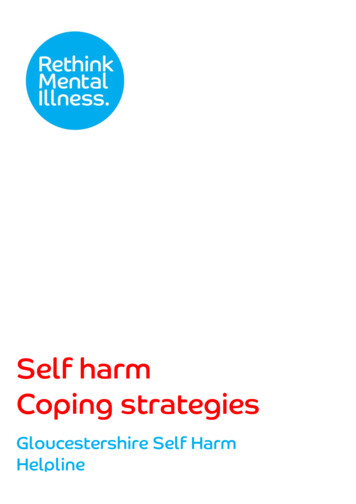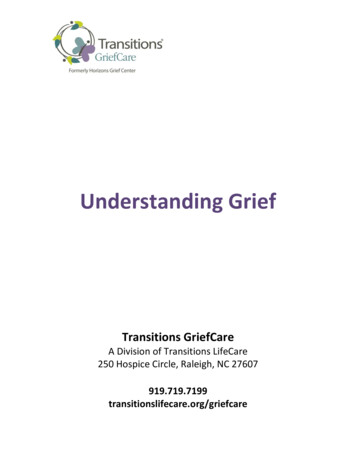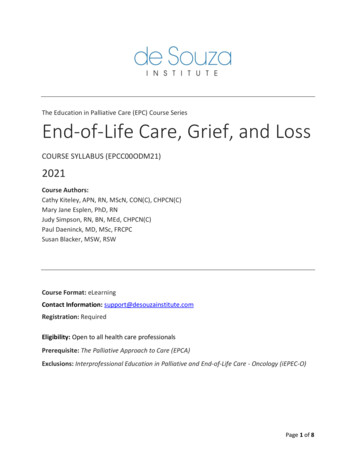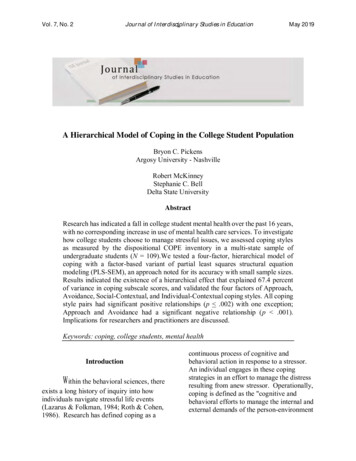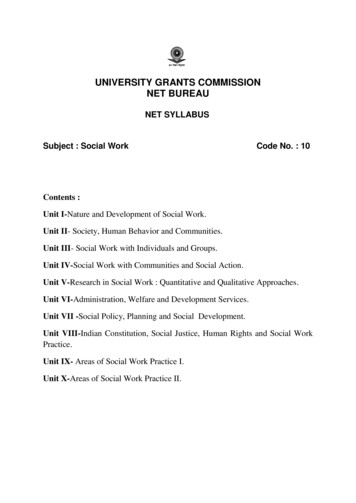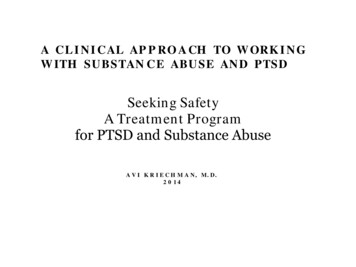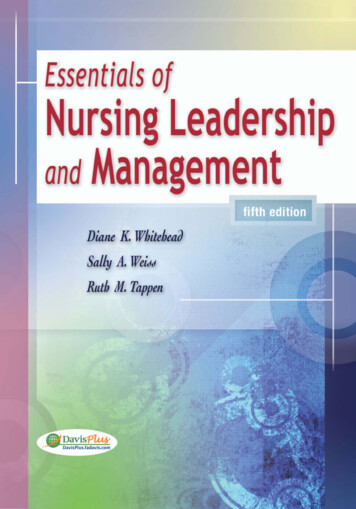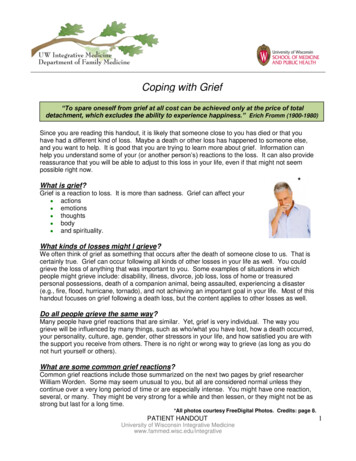
Transcription
Coping with Grief“To spare oneself from grief at all cost can be achieved only at the price of totaldetachment, which excludes the ability to experience happiness.” Erich Fromm (1900-1980)Since you are reading this handout, it is likely that someone close to you has died or that youhave had a different kind of loss. Maybe a death or other loss has happened to someone else,and you want to help. It is good that you are trying to learn more about grief. Information canhelp you understand some of your (or another person’s) reactions to the loss. It can also providereassurance that you will be able to adjust to this loss in your life, even if that might not seempossible right now.*What is grief?Grief is a reaction to loss. It is more than sadness. Grief can affect youractionsemotionsthoughtsbodyand spirituality.What kinds of losses might I grieve?We often think of grief as something that occurs after the death of someone close to us. That iscertainly true. Grief can occur following all kinds of other losses in your life as well. You couldgrieve the loss of anything that was important to you. Some examples of situations in whichpeople might grieve include: disability, illness, divorce, job loss, loss of home or treasuredpersonal possessions, death of a companion animal, being assaulted, experiencing a disaster(e.g., fire, flood, hurricane, tornado), and not achieving an important goal in your life. Most of thishandout focuses on grief following a death loss, but the content applies to other losses as well.Do all people grieve the same way?Many people have grief reactions that are similar. Yet, grief is very individual. The way yougrieve will be influenced by many things, such as who/what you have lost, how a death occurred,your personality, culture, age, gender, other stressors in your life, and how satisfied you are withthe support you receive from others. There is no right or wrong way to grieve (as long as you donot hurt yourself or others).What are some common grief reactions?Common grief reactions include those summarized on the next two pages by grief researcherWilliam Worden. Some may seem unusual to you, but all are considered normal unless theycontinue over a very long period of time or are especially intense. You might have one reaction,several, or many. They might be very strong for a while and then lessen, or they might not be asstrong but last for a long time.*All photos courtesy FreeDigital Photos. Credits: page 8.PATIENT HANDOUTUniversity of Wisconsin Integrative Medicinewww.fammed.wisc.edu/integrative1
Coping with GriefActions:Trouble falling asleep or waking up too earlyEating too much or too littleBeing absent-mindedWithdrawing from others; feeling less interested in the worldDreaming of the deceasedAvoiding reminders of the deceasedSearching and calling out the name of the deceased personSighingBeing restlessly overactiveCryingVisiting places or carrying objects that remind you of the deceased personStrongly treasuring objects that belonged to the deceasedEmotions:SadnessAngerGuilt or rning (pining for the person [or whatever you lost]; thinking “if only” this had nothappened)Emancipation (Not all feelings are negative. Sometimes there is a sense of beingreleased when a loss occurs).Relief (May especially be felt after someone dies from a lengthy or painful illness or if yourrelationship with the deceased was a difficult one).Numbness—a lack of feeling (Numbness may actually protect you from a flood of feelingsall occurring at the same time).ThoughtsDisbelief, thinking the loss did not happenConfused thinking, difficulty concentratingPreoccupation, obsessive thoughts about the deceased or whatwas lostSensing the presence of the deceased, thinking the deceased isstill thereHallucinations, seeing and/or hearing the deceasedPATIENT HANDOUTUniversity of Wisconsin Integrative Medicinewww.fammed.wisc.edu/integrative2
Coping with GriefFeelings in the bodyHollowness in the stomachTightness in the chestTightness in the throatOversensitivity to noiseFeeling that nothing is real, maybe even feeling that you arenot real yourselfBreathlessness, feeling short of breathMuscle weaknessLack of energyDry mouthSpiritualityFeeling that you have lost direction in lifeSearching for meaning in the lossQuestioning your religious or spiritual beliefsHow long does grief last?The length of time it takes to adjust to a loss is different for each person and in eachcircumstance. Grieving often takes much longer than people think. If someone has died, you willcope with many new experiences the first year without the person. Some people find the secondyear is also difficult, as the loss becomes more real to them. It is helpful to be gentle withyourself, allowing as much time as you need to adjust.It can be comforting to know that grief tends to come in waves, so youwill not be distressed constantly. At times you may feel upset andheartbroken, but in between these times, you may be content andenjoy many things. Usually grief reactions start to fade within sixmonths. As time goes on, you will not feel the grief reactions asstrongly or as much. In time you can learn to live your life fully andhappily despite the loss.As you adjust to your loss, you might find that grief reactions pop up from time to time, even aftermany years. This is very common. This grief might be triggered by many things such as songs,a season of the year, birthdays, holidays, anniversaries or special events in your life, which youmay wish the deceased could enjoy with you. Usually these grief episodes are short-lived.Can grief start before a loss occurs?Grieving can start even before a loss occurs, when you know that a loss is about to happen. Thisis called anticipatory grief. Anticipatory grieving might start, for example, if the health of someoneclose to you is declining, if you are diagnosed with a medical condition that will limit youractivities, or if your job is ending. Anticipatory grieving is usually a healthy reaction. It can triggeryou to start preparing for the loss and for how you will cope.PATIENT HANDOUTUniversity of Wisconsin Integrative Medicinewww.fammed.wisc.edu/integrative3
Coping with GriefWhat if grief is hidden from others?Grief that is hidden from others is called disenfranchised grief. It is the grief you experience if youdo not publicly acknowledge or mourn your loss or receive support from others. Grief may bedisenfranchised if others do not recognize your relationship to the person who died, if the type ofloss is not supported by others, or if there is stigma related to the loss. Examples of losses thatsome people may not share with others include: the death of an ex-spouse or former friend, thedeath of a companion animal, the loss of ability, or death from suicide, AIDS, or a criminal act.Grief can also be disenfranchised if others try to “protect” the bereaved by not discussing theloss. This happens sometimes for children, people with intellectual disabilities and the elderly.If your grief is disenfranchised—not known or supported by others—you may have a harder timeadjusting to the loss. To help face such a loss, choose someone whom you trust to talk withabout the loss. How you feel about the loss is important. Being able to tell this to anunderstanding person can be helpful.“Look well into thyself. There is a source of strength which will always spring up if thouwill always look there.” Marcus Aurelius (121-180)How can I learn to live with this loss in my life?Over time and by doing grief work, you can learn to live welldespite your loss. William Worden described four taskspeople do when grieving a loss.TASKS OF MOURNINGTask I: To accept the reality of the loss.Task II: To process the pain of griefTask III: To adjust to a world without the deceased.External: How has the death affected your everyday life?Internal: How has the death affected your feelings about yourself and your abilities?Spiritual: How has the death affected your spiritual beliefs and views of the world?Task IV: To find an enduring connection with the deceased in the midst of embarking on a new life.What are some ways to do this grief work and cope with my loss?“Grief is itself a medicine.” William CowperPeople cope with loss in many different ways. Following are a few suggestions to consider:Healthy lifestyleFirst, take good care of yourself. Try to get enough sleep, eat a good balance of healthyfoods, and avoid using alcohol and unprescribed drugs for relief.PATIENT HANDOUTUniversity of Wisconsin Integrative Medicinewww.fammed.wisc.edu/integrative4
Coping with GriefExercisePhysical activity can help you cope and will help keep you healthy. Do any kind ofphysical activity that you have enjoyed in the past or try a new one. Doing the activity withothers may be even more helpful.Support from family and friendsPeople need support from others for their losses. Do nothesitate to accept or even ask for the help or support you need.Most people are glad to help if they know what you need. Somepeople who are grieving need to tell the story of their loss overand over again as they come to terms with it. This is not bad orunusual. But sometimes family and friends become impatient oruncomfortable with this repeated conversation. They might notunderstand that all they have to do is listen. If you think thismight be happening to you, try to talk with a family member orfriend who is a particularly good listener who can take the timeto be with you or consider seeing a grief counselor or attendingmeetings of a grief support group.Grief support groupsGrief support groups are available in many communities and also on-line. Some groupsare open to anyone. Others may be restricted, e.g., a group for young widows. You canfind out about a group in your area by contacting hospice staff or chaplains or socialworkers at local hospitals. For an integrative medicine approach, consider a group thatincorporates Mindfulness Based Stress Reduction (MBSR), which is based on Easternphilosophies and uses meditation to calm the mind and body.RitualsA ritual is an activity that is done to remember and honor the person who died. It may berelated to your cultural traditions. A visitation or wake and a funeral or memorial serviceare examples of rituals. You can also do many kinds of informal rituals that will honor thedeceased and help yourself. Some examples: lighting candles on special dates toremember the deceased, sewing a memory quilt (which may be created from clothes ofthe deceased), planting a memory garden, sharing a memory dinner to celebrate the lifeof the deceased.Writing or journalingWriting or journaling about your grief experience can help you express your feelings andthe importance of your loss. If there is something you wish you could have told the personbefore s/he died, consider writing a letter to the deceased person. Afterwards, you cankeep the letter, bury it, or destroy it—whatever feels right to you. (See our handout UsingJournaling to Aid Health).ForgivingAn unexpected death can leave you with “unfinished business” with the deceased. If youhave a sense of previously being “wronged” by the deceased, you may want to focus onforgiveness. (See our handout Healing through Forgiveness).PATIENT HANDOUTUniversity of Wisconsin Integrative Medicinewww.fammed.wisc.edu/integrative5
Coping with GriefNatureSpending time in nature can be soothing and healing.BooksMany books have been written on coping with grief, some by authorswho have gone through their own grief journeys. To find one thatmeets your needs, browse at your local bookstore or review the booklists at the websites of organizations listed on page 7.Non-drug ways to prevent or treat depressionIf you want to learn more about preventing or treating depression, see our patient handouton this topic.MassageIf you are feeling tension or pain in your muscles from “holding ontogrief”, consider therapeutic massage. Massage therapists can befound in many communities.Healing touchAnother integrative medicine approach is Healing Touch, which is a form of energymedicine. Practitioners place their hands near or gently on the body to clear, energize,and balance the energy fields. The goal is to restore balance and harmony, so you areplaced in an optimal position to self-heal. A directory for certified healing touchpractitioners is at ctory.shtml .What should I do if I do not feel better over time?Most people move through their grief, adjust to the loss, and resume a changed but full life.Usually grief reactions start to fade within about six months. Some people, however, do not feelbetter as time goes on and may even feel worse and have trouble functioning in their daily lives.If this describes you, seek help from a professional who will determine if you might beexperiencing complicated grief, depression, or posttraumatic stress disorder. If you are havingthoughts of suicide, seek help right away. There are caring professionals available who can helpyou cope with this difficult time in your life. (See next section).Complicated griefIn complicated grieving, reactions last a long time, even years, and may become worseover time. You may have trouble accepting the death and resuming life. Complicatedgrief is different from depression and may not respond to treatments for depression.DepressionDepression is an illness with some symptoms similar to those of grief. If you aredepressed and receive treatment for it, you will be better able to do the grief worknecessary to cope with your loss. (For more information, see our handout, “Non-drugapproaches to help move from depression to feeling happier with more energy.”)Posttraumatic stress disorder (PTSD)You could have posttraumatic stress disorder if the circumstances of your loss wereviolent or shocking in some way. You might have recurring recollections of the death (orloss) that are very disturbing.PATIENT HANDOUTUniversity of Wisconsin Integrative Medicinewww.fammed.wisc.edu/integrative6
Coping with GriefWhere can I go for help if I need it?The following are professionals who can help.Primary care practitionerSome grief reactions are very similar to the symptoms of different illnesses. It can be agood idea to see your primary care physician first to rule out the possibility of anothermedical condition. Be sure to tell the clinician about your loss.Grief counselorGrief counselors can be very helpful in helping you cope. Thesecompassionate specialists may have a wide variety of credentials (e.g.,bereavement counselor, clergy, psychologist, social worker) and arefound in many settings, such as clinics, funeral homes, hospices, andprivate practice. Not all professionals with degrees in these helpingfields have focused on grief in their careers. Contact leaders of griefsupport groups, hospice staff, or funeral directors to learn aboutcounselors available in your area.Mental health professionalClinical social workers, psychologists, and psychiatrists can diagnose complicated grief,depression, and posttraumatic stress disorder and direct your treatment.Spiritual leaderSome losses can cause you to question your spiritual beliefs. This is not an unusualreaction. If this happens, you might feel ungrounded without your former beliefs forsupport. This can also become a time when you strengthen your beliefs or grow in newdirections. Meeting with a chaplain, clergy, or other spiritual leader may be helpful.Where can I find more information?The following websites provide information and resources on grief and loss.ORGANIZATIONHospice Foundationof AmericaAARPGriefNet.orgThe CompassionateFriendsSurvivors of SuicideRESOURCESBrief articles on grief topics.Grief and loss pages/page.asp?page id 171387www.aarp.org/families/grief lossAn internet community ofpersons dealing with grief,death, and major loss.Assists families following thedeath of a child of any age.Website created by a survivor .orgwww.survivorsofsuicide.comPATIENT HANDOUTUniversity of Wisconsin Integrative Medicinewww.fammed.wisc.edu/integrative7
Coping with GriefReferencesThe following literature was used in the creation of this handout:1. Doka KJ. Grief: The constant companion of illness. Anesthesiology Clin N Am. 2006; 24:205-212.2. Doka KJ. Challenging the paradigm: New understandings of grief. In: Doka K, editor. Living with grief:Before and after the death. Washington (DC): Hospice Foundation of America; 2007;87-102.3. Rando TA. Treatment of Complicated Mourning. Champaign, IL: Research Press;, 1993.4. Worden, JW. Grief Counseling and Grief Therapy: A Handbook for the Mental Health Practitioner (4thEdition). New York: Springer Publishing Company, 2009.5. Mayo Clinic Staff. Complicated grief. Accessed on 8/5/2008 01023/DSECTION coping%2Dand%2Dsupport.6. Prigerson HG, Jacobs SC. Caring for bereaved patients: ”All the doctors just suddenly go.”JAMA:2001; 286:1369-1376.7. Ringold S. Grief. JAMA Patient Page. 2005; 293(21) accessed at www.jama.com on 12/10/07.8. Corr CA. Anticipatory grief and mourning: An overview. In Doka KJ (Ed.) Living with Grief: Before andafter the Death. Washington, DC: Hospice Foundation of America, 2007;5-20.9. Rando TA. Clinical dimensions of anticipatory mourning: theory and practice in working with the dying,their loved ones and their caregivers. Champaign, IL: Research press, 2000.10. Doka K (Ed.). Disenfranchised grief: Recognizing Hidden Sorrow. Lexington, MA: Lexington, 1989.11. Anonymous. Introduction to healing touch. Accessed at www.healingtouchprogram.com on 8/20/08.You can find additional references in our clinician version of this handout.Photo creditsAll photos are courtesy of FreeDigitalPhotos.net. In order of appearance:1. Ambro8. Graur Razvan Ionut2. Imagery Majestic9. Adamr3. Imagery Majestic10. Ambro4. Stock Images11. Satit Srihin5. Ohmega 198212. David Castillo Dominici6. Graur Razvan Ionut13. Ambro7. Michelle MeiklejohnThe information in this handout is for general education. Please work with your healthcare practitioner to use this information in the best way possible to promote your healthand happiness.This handout was created by Charlene Luchterhand, MSSW, Education/Research Coordinator,Integrative Medicine Program, Department of Family Medicine, University of Wisconsin-Madison.Date created: January 2009; Revised: April 2013Notes:PATIENT HANDOUTUniversity of Wisconsin Integrative Medicinewww.fammed.wisc.edu/integrative8
meetings of a grief support group. Grief support groups Grief support groups are available in many communities and also on-line. Some groups are open to anyone. Others may be restricted, e.g., a group for young widows. You can find out about a group in your area by contacting hospice

